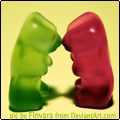offline
- snoop

- Genghis Khan

- Pridružio: 18 Apr 2003
- Poruke: 8134
- Gde živiš: U kesici gumenih bombona...
|
Known for such powerful hits as "Two Minutes to Midnight" and "The Trooper," Iron Maiden was and is one of the most influential bands of the heavy metal genre. The often-imitated band existed for over 20 years, pumping out wild rock similar to Judas Priest. Iron Maiden has always been an underground attraction; although failing to ever obtain any real media attention in the U.S. (critics claimed them to be Satanists due to their dark musical themes and their use of grim mascot "Eddie"), they still became well-known throughout the world and have remained consistently popular throughout their career. Iron Maiden was one of the first groups to be classified as "British metal," and, along with Black Sabbath, Led Zeppelin, and a host of other bands, set the rock scene for the '80s.
Iron Maiden was first formed in 1976 by bassist Steve Harris, who would soon join up with rhythm guitarist Tony Parsons, drummer Doug Sampson, and vocalist Paul Di'Anno. Before finally obtaining a record deal, the group played in local areas throughout the '70s, receiving a fair amount of London airplay. Parsons was replaced with Dennis Stratton, and the band made its record debut in 1980 with their self-titled Iron Maiden album. Although the release was recorded in a hurry, it was nonetheless a hit in the U.K. due to the single "Running Free." Iron Maiden's 1981 follow-up, Killers, displayed a harder approach to their music than before, and also saw the replacement of Stratton with Adrian Smith. Due to his uncontrollable alcohol addiction, Di'Anno was forced to part company with the group and would soon be replaced with vocalist Bruce Dickinson in 1982 for the band's groundbreaking release, Number of the Beast. This album, boasting such songs as the title track and "Hallowed By thy Name," would come to be known as one of the greatest rock recordings of all time. Since the unexpected worldwide success of Beast made them international rock superstars, they changed very little of their style for their next album, Piece of Mind. They undertook two major tours before recording 1983's Powerslave, which would go on to be another cult hit. The product of Powerslave's 11-month tour was 1985's Live After Death, a double live album the featured all of their biggest hit singles.
By the release of Live After Death, Iron Maiden had already established themselves as a powerful and unique metal band. Their long-awaited 1986 supplement album, Somewhere in Time, showed a bit of departure from their past releases, showcasing the use of synthesizer guitars and songs more relevant to the same themes. 1988's Seventh Son of a Seventh Son, a concept album like its predecessor, featured the singles "The Evil That Men Do" and "The Clairvoyant," and soon became Iron Maiden's most critically acclaimed album since Number of the Beast. After another exhausting tour, Smith departed and the band took a one-year hiatus. With new guitarist Janick Gers, they resurfaced with No Prayer For the Dying in 1990, a record that returned to the classic sound the group used when recording their earlier releases. One of the album's singles, "Bring Your Daughter to the Slaughter," was granted the Golden Raspberry Award for Worst Song of the Year, but it nonetheless gave the band its first number one U.K. hit. By the time the group finished their 1991 tour, Dickinson expressed desire to leave and work to promote another band he had founded, the Skunkworks. Fear of the Dark, the band's last album with Dickinson, debuted at number one on the U.K. charts and became one of their biggest selling albums to date. After their supporting tour, two live albums were released in 1993: A Real Live One, which contained live versions of their newer hit singles, and A Real Dead One, which featured the more "classic" Maiden songs live. Dickinson's replacement, Blayze Bayley, marked his debut in 1995 with The X Factor. While the record failed to chart as well as some of its predecessors, it was still a minor success in England. Iron Maiden marked the end of 1996 with Best of the Beast, a double compilation album. In 1998, little interest in the Virtual XI album prompted Bayley's termination; Dickinson and Smith returned to the band for a tour in 1999 and a new album, Brave New World, emerged the following year. ~ Barry Weber, All Music Guide
|

